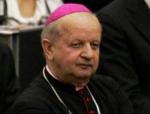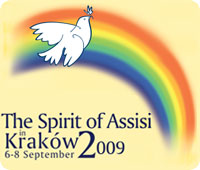
Kardinal, Erzbischof von Krakau, Polen
|
Homily
Cardinal Stanislaw Dziwisz
Eucharistic Liturgy
International Meeting for Peace.
Krakow, 6th September 2009
(Acts 5, 12-16, Rev. 1,911a 12-13.17.19; John 2,19-31)
Brothers and sisters!
1. In our hearts and minds we return to Jerusalem, where “many signs and wonders were worked among the people at the hands of the apostles”. The primitive Church was enriched with new disciples of Jesus Christ. “The numbers of men and women who came to believe in the Lord increased steadily”. Moved at this sight, we look upon the streets of the Holy City along which “the sick were even taken out and laid on beds and sleeping-mats in the hope that at least the shadow of Peter might fall across some of them as he went past”. All the sick and those tormented by unclean spirits were healed (cf. Acts 5,12.14-16).
Faith in the crucified and risen Lord worked miracles. It cured the sick. It returned the joy of living to the suffering. It changed people’s hearts. It re-awakened hope in them.
This amazing scene still continues today. It has done so for two-thousand years. It is repeated in every corner of the world which is reached by the Good News of Jesus of Nazareth. It is repeated at every new generation. It is also repeated in front of our very eyes. Each and every one of us has been given the opportunity to experience the great wonders the Lord has performed in his life.
Today, coming from many different countries in the world, we have gathered here for a common prayer in a Christian sanctuary. This sanctuary, this place, reminds us in a special way that Mercy is the name of God. The Almighty God bends over us, he heals our weaknesses, he leads us to unity and he listens to our fervent prayers for mercy and peace in the whole world.
2. The first gift of the risen Lord is peace. In the passage of the Gospel of John that was read, we heard three times: “Peace be with you!”. (John 20,19.21-26). Jesus’ peace is born in a heart reconciled with God and with one’s neighbour. Jesus’ peace dispels the darkness of evil and sin, it restores our inner freedom and makes us capable of greater love and greater service. The peace Jesus brings forges brotherly bonds, it establishes communities, and it makes us the one people of God. The peace of Jesus is the anticipation of a new and unimaginable reality: his kingdom of endless love.
By carefully examining our attitudes and behaviours, we must admit that we are full of Thomas’s disbelief: “Unless I can see the holes that the nails made in his hands and can put my finger into the holes they made, and unless I can put my hand into his side, I refuse to believe” (John20,25). Do we truly believe that the Risen is present among us? Do we truly believe that He is the only one who can heal our weaknesses, teach us humbleness, understanding and generosity for our neighbours? Are we capable of showing, by the transparency of our lives, that Lord who conquers Man, who summons human beings to the cause he came to the world for?
Jesus needs the witness of his disciples in our contemporary world. That is why tells us, too: “Peace be with you! As the Father sent me, so am I sending you” (John 20,21). To be a disciple of Jesus means to identify with his person and his mission. He needs our minds and our hearts. He needs our goodness and our mercy, our words uttered with profound faith and believing he is “the Christ, the Son of God”, so that the world may believe and have life through his name. (John 20,31).
3. Today our mission and our witness take on a special form, that of the International Congress for Peace “People and Religions”. Let us consider our participation to the Congress as our Christian voice, as our steady steps as “messengers, heralds of peace” to the troubled world the prophet Nahum speaks to (Nahum 2,1).
Let us take part in this exceptional event. From Cracow, the city of John Paul II, indefatigable pilgrim and messenger of peace, a choral voice rises in these days, a prayer addressed to the Almighty, begging for the gift of peace for our troubled times. It rises from people of goodwill, form people of different religions, spiritual traditions and cultures. The spirit of Assisi is kindled among us once again, speaking to the imagination and consciences not only of the disciples of the Master from Nazareth.
Let us remember: the land where we meet has been through the “tribulation” John speaks of in his Revelation (Rev 1:9). In these days we remember the anniversary of the tragic outbreak of World War II. A sinister symbol of those dark years is the concentration camp of Auschwitz-Birkenau, where we shall go as pilgrims, repeating in our minds and hearts the words “Holy God, Holy Mighty One, Holy Immortal One, have mercy on us”.
The land where we gather has been through the humiliation caused by the communist ideology: for decades it has tried to rule over the consciences of people, trampling on their dignity, depriving them of their freedom, promising to build heaven on earth, only a godless heaven. This ideology has left spiritual and material ruins behind. Now we are patiently building afresh the shattered home of human and Christian values, just as the other people of Central and Eastern Europe are doing. We do so in the spirit and words of Paul of Tarsus: “Do not be mastered by evil, but master evil with good” (Rom. 12,21).
4. The Son of Man of the Revelation speaks to each and every one of us today: “Do not be afraid; it is I, the First and the Last; I am the Living One” (Rev. 1,17-18). The spiritual patron of our Congress in Cracow, John Paul II, began his pontificate with similar words, saying “Do not be afraid. Open wide the doors for Christ. To his saving power open the boundaries of States, economic and political systems, the vast fields of culture, civilization and development. Do not be afraid!” (22nd October 1978, n. 5).
The Congress for Peace in Cracow remains faithful to these words. It remains faithful to the Gospel. Amen!
|

